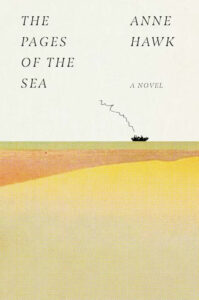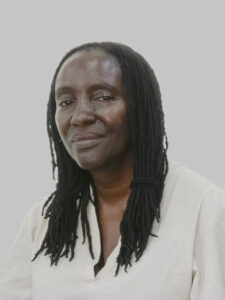The ‘darkness in big people’s lives’
The Pages of the Sea
by Anne Hawk
Windsor: Biblioasis, 2024
$24.95 / 9781771966535
Reviewed by Jessica Poon
*

The Pages of the Sea by Anne Hawk is a sensitive, ‘60s-era coming of age novel about Wheeler, currently residing in her mother’s childhood home on an unspecified Caribbean island. She lives with her sisters, cousins, and aunts. Wheeler’s mother is in the United Kingdom, trying to earn a better living.
Though grounded by her cousin, Donnell, Wheeler is often unmoored—her sisters don’t provide clear answers when Wheeler asks when their mother will return; her older cousin, Floyd, has a fearsomely volatile temper, exhibiting violent tendencies; Tant’Innez and Tant’Celeste, the aunts, intentionally avoid each other.
Written in third-person, Wheeler’s thoughts are all rendered in dialect and all other narration is rendered in what is regarded as standard English. For instance:
Wheeler gravitated towards Celeste like the tide towards a shuddering moon.
Tant’Celeste di’always busy – just like dey mudda. Else she looking f’sumting t’do.
Celeste did not look up. If she had the sense of being scrutinized or compared to someone else, she betrayed no sign of it.
The writing is often highly visual and lyrical. Hawk is a class stylist in evoking strong setting:
Flotillas of schoolchildren bustled along Russell Street, white school shirts bobbing in the sun. Chalk-white walls, blue piping, the cinema building beamed in the early light, a giant wedding cake abandoned by the shore. At the gap, where the road turned, there was a squat pitch pine structure. The rum shop. One of its padlocked windows was cut higher than the other. From its narrow roadside lot, the rum shop appeared to be squinting at the view.
A few people were making their way across the gap to Wharf Road. The sea was no longer golden. The band pit stood empty. The bread shop had become anonymous on the edge of the opening without its heralding light.”

I don’t know whether there is a collective noun for schoolchildren, but given the prominence of boat and sea imagery in the novel, “Flotillas of schoolchildren” is apt. Continuing the seafaring imagery is Hawk’s use of the verb “bobbing” to describe the schoolchildren’s uniforms. The simple sentence fragment, “The rum shop,” is beautifully stark and minimal, ending with a pleasingly soft plosive. The rum shop is personified as “squinting.” A distinct place—the bread shop—is described as “anonymous,” an adjective usually reserved for unusually humble scribes trying to avoid wrath—another wonderful bit of personification.
There is no mistaking the plaintiveness of Wheeler’s desire for her mother: “The memory of her mother’s departure overwhelmed her. How she inside could pain so?”
Hawk, a Metro Vancouver resident for several of her formative years, describes a leg injury of Donelle’s beautifully: “… the rip in Donelle’s leg looked like an upside-down, rusted zip: dark nugget scar at the top with scabby interlocking teeth, set in a bloodless, yellow fluid.”
The chapters tend to be short; the sun and the sea are mentioned frequently. When Wheeler asks, “Wha if Floyd keep beating me?” the pragmatic response from her sister is, simply: “Y’mus try not t’do nutting wrong.” The more Wheeler learns and observes, the more disillusionment she experiences.
Writers attempting to capturing the voice of a child often ring excessively false. If the voice seems improbably precocious—matching, perhaps, the exact emotional intelligence of its considerably older author—a reader’s credulity experiences strain from the distraction. Conversely, a child’s voice may be a little too twee, a gross caricature of a child’s innocence, asinine to the point of insulting children and adults alike. In The Pages of the Sea, Hawk calibrates Wheeler’s innocence and isolation perfectly without erring into either pitfall. Wheeler is believably observant, but still innocent, still searching.
Hawk’s poetic debut novel is a powerful lens into abandonment, childhood, and loss.

*

Originally from East Vancouver, Jessica Poon is a writer, former line cook, and pianist of dubious merit who recently returned to BC after completing a MFA in Creative Writing at the University of Guelph. [Editor’s note: Jessica Poon recently interviewed Sheung-King, and has reviewed books by Pat Dobie, Giana Darling, Umar Turaki, Katrina Kwan, Jane Boon, Terese Svoboda, Maia Caron, Wendy H. Wong, Andromeda Romano-Lax, Sarah Leipciger, Katrina Kwan, Shelley Wood, Richard Kelly Kemick, Elisabeth Eaves, Rajinderpal S. Pal, Keziah Weir, Amber Cowie, Robyn Harding, Roz Nay, Anne Fleming, Miriam Lacroix, Taslim Burkowicz, Sam Wiebe, Amy Mattes, Louis Druehl, Sheung-King, Loghan Paylor, Lisa Moore (ed.), Sandra Kelly, and Robyn Harding for BCR]
*
The British Columbia Review
Interim Editors, 2023-26: Trevor Marc Hughes (non-fiction), Brett Josef Grubisic (fiction and poetry)
Publisher: Richard Mackie
Formerly The Ormsby Review, The British Columbia Review is an online book review and journal service for BC writers and readers. The Advisory Board now consists of Jean Barman, Wade Davis, Robin Fisher, Barry Gough, Hugh Johnston, Kathy Mezei, Patricia Roy, and Graeme Wynn. Provincial Government Patron (since September 2018): Creative BC. Honorary Patron: Yosef Wosk. Scholarly Patron: SFU Graduate Liberal Studies. The British Columbia Review was founded in 2016 by Richard Mackie and Alan Twigg.
“Only connect.” – E.M. Forster
2 comments on “The ‘darkness in big people’s lives’”